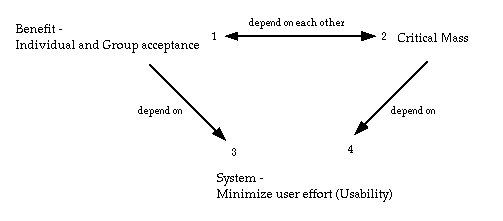Criteria for effective groupware
Introduction
"Criteria for effective groupware" was the title of a panel organised
by Andrew Monk and Jean Scholtz at
CHI'96 in Vancouver. The panel was to
discuss what makes for effective, and ineffective, groupware. After the
panelists (Bill Buxton, David Frohlich, Sara Bly and Steve Whittaker) had
briefly talked about their criteria the audience was asked to
suggest additional citeria, drawn from their own personal experiences with groupware.
They did this by completing a form. This asked them for: (i) a name
for their criterion; (ii) an example of the problems that arise if the problem
is not met, and (iii) example of the kinds of inventions, features or strategies
that can meet this criterion.
These pages include all the forms that we got (and could read!) They are
numbered and anonymous. We have gathered them together in categories using
a scheme described below. To see the orginal text from the forms click on
one of categories in the scheme and then one of the numbers in the text.
People had a lot of trouble making up a good title for the criterion (well
they did'nt have a lot of time to think!) but the further explanation generally
made clear the point. On occasions we have added words [in brackets like
this] to make it easier to read or when guessing an illegible word.
The criteria - a scheme
The criteria have been grouped into three broad categories: Benefit
- Individual and Group acceptance ; Critical
Mass, and System
- Minimize user effort (Usability).
Click on one of these categories to see the criteria suggested
The picture below shows how the categories might be thought to
relate to each other.

1. There is no benefit for individual or group if there are insufficient
people connected (ref:Whittaker).
2. People will not connect unless they can see individual benefit (ref:Frohlich).
3. Benefit for individual and group depends on ease-of-use and ease-of-learning(ref:
Bly, Buxton).
4. Perceived difficulty-of-use or difficulty-of-learning will deter people
from connection.
(Back) to
CHI'96 proceedings
Credits
These web pages were created by:
Mioko Ambe (Sony
Human Interface Laboratory, Tokyo),
Andrew Monk (University of York, UK)
and
Jean Scholtz,
UserWorks, Inc.
2092 Gaither Road, Suite 200
Rockville, MD 20850; 1-301-320-7898;
jcscholtz@aol.com
Please address enquiries to:
Andrew Monk, Department of Psychology, University of York, York. UK.
YO1 5DD.
Tel: 0904 433148, Fax (+44) 0904 433181
am1@york.ac.uk

